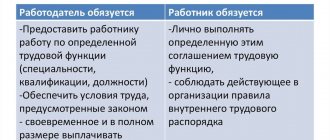- August 31, 2020
- Legislation
- Natalia Kalinichenko
A collective agreement is a normative act concluded at the level of an individual enterprise between employees and the employer. The document must contain the obligations of the parties, rights, and in no case worsen the position of employees in relation to the requirements of current labor legislation.
A collective agreement can be concluded throughout the entire enterprise or in a separate separate structural unit, branch, or representative office. Even an individual entrepreneur can sign an agreement with his employees.
The parties to the agreement are the employees and the employer represented by the enterprise administration.
Responsibilities or rights?
Many employers wonder whether a collective agreement is required in an organization. The Labor Code does not oblige the parties to enter into such an agreement, but only recommends it. The employee, after he begins to perform his job duties, is not even required to sign such a document if he does not want to join the agreement.
On the other hand, if the organization’s employees wish to conclude a collective agreement and put their initiative in writing, then the administration is obliged to consider the request and make a decision regarding the conclusion of the agreement.
So, we have considered the question of whether a collective agreement is mandatory in an organization. It is not binding until one of the parties comes up with an initiative regarding the conclusion. Until this moment, no one has any obligation to conclude an agreement.
Is it necessary to conclude a collective agreement in the organization or not?
Analysis of the requirements of Art. 36 of the Labor Code of the Russian Federation allows us to clearly say whether a collective agreement is mandatory for conclusion. In the absence of initiative by either party to the labor relationship, the conclusion of such an agreement is not mandatory.
However, if an employer receives a proposal to conduct collective bargaining, he is obliged to enter into negotiations within a week. Otherwise, liability is provided (we will talk about it later).
Unreasonably avoiding concluding an agreement after entering into negotiations is also not permitted. Thus, if the parties entered into negotiations, the agreement must be signed. The only exception is a situation where employees offer illegal conditions and the employer reasonably does not agree with them. In this case, his actions in not concluding an agreement are lawful.
As for the mandatory presence of a collective agreement in an organization, this document is not one of the necessary ones. In view of this, and liability for the fact that it is absent, is not provided for by law.
Responsibility
It should be remembered that in addition to deciding whether a collective agreement is mandatory in the organization, the employer becomes liable if he refused to conclude it after the employees took the initiative.
For refusal, the employer faces administrative liability in the form of a fine from 3,000 to 5,000 rubles (Article 5.30 of the Administrative Code).
A number of actions on the part of the enterprise administration are also recognized as an administrative violation, namely:
- avoidance of the negotiation process;
- violation of the deadlines provided for by labor legislation regarding the conclusion of a contract;
- hiding necessary information.
For such offenses, the company faces fines ranging from 1,000 to 3,000 rubles.
Even if the question of whether a collective agreement is mandatory for an LLC was resolved positively and it was concluded, but the employer does not fulfill its obligations, he faces administrative liability for this. According to the requirements of Art. 5.31 of the Code of Administrative Offences, a warning may be issued or a fine may be imposed in the amount of 3 to 5 thousand rubles.
By the way
| Guarantees and compensation for persons participating in collective bargaining Persons participating in collective negotiations and the preparation of a draft collective agreement are released from their main work while maintaining their average earnings for a period determined by agreement of the parties, but not more than three months. All costs associated with participation in collective negotiations are compensated in the manner established by labor legislation and other regulatory legal acts containing labor law standards, a collective agreement, and an agreement. Payment for the services of experts, specialists and intermediaries is made by the inviting party, unless otherwise provided by the collective agreement or agreement. Representatives of workers participating in collective negotiations, during the period of their conduct, cannot, without the prior consent of the body that authorized them for representation, be subject to disciplinary action, transferred to another job or dismissed at the initiative of the employer, with the exception of cases of termination of the employment contract for committing an offense, for which, in accordance with the Labor Code of the Russian Federation and other federal laws, provides for dismissal from work. |
Representatives of a party who have received a proposal in writing to begin collective bargaining are required to enter into negotiations within seven calendar days from the date of receipt of the proposal by sending a written response to the initiator of collective bargaining indicating representatives from their side to participate in the work of the collective bargaining commission and their powers.
Stage 2. Formation of a collective bargaining commission
In accordance with Art. 35 of the Labor Code of the Russian Federation, a commission is created in the organization to conduct collective negotiations, prepare a draft collective agreement and conclude it. This commission includes representatives of employees and employers on an equal basis.
The employer issues an order indicating the persons who will represent its interests in the collective bargaining commission.
Stage 3. Conducting collective bargaining
Note! The start date of collective negotiations is the day following the day the initiator of collective negotiations receives a written response
Representatives of the parties participating in collective negotiations are free to choose issues related to the regulation of social and labor relations.
The timing, place and procedure for holding collective negotiations are determined by representatives of the parties participating in the negotiations.
The parties must provide each other no later than two weeks from the date of receipt of the relevant request with the information they have necessary for conducting collective bargaining.
Participants in collective bargaining and other persons associated with collective bargaining must not disclose information received if this information relates to a secret protected by law (state, official, commercial or other). Persons who disclosed the specified information are subject to disciplinary, administrative, civil, and criminal liability in the manner established by the Labor Code of the Russian Federation and other federal laws.
Stage 4. Resolution of disagreements
If during collective negotiations no agreed decision is made on all or individual issues, then a protocol of disagreements is drawn up. The settlement of disagreements that arose during collective negotiations on the conclusion or amendment of a collective agreement is carried out in the manner established by the Labor Code of the Russian Federation.
Collective negotiations have been going on in our organization for two months now, but the draft collective agreement still does not suit any of the parties. How long can disagreements be resolved?
If agreement is not reached between the parties on certain provisions of the draft collective agreement within three months from the date of the start of negotiations, the parties will be required to sign a collective agreement on the agreed terms and simultaneously draw up a protocol of disagreements.
Unsettled disagreements may be the subject of further collective negotiations or resolved in accordance with the Labor Code of the Russian Federation and other federal laws.
Stage 5. Conclusion of a collective agreement
A collective agreement is concluded by representatives of the parties participating in collective bargaining in accordance with their powers. In addition, a collective agreement can be adopted at a general meeting (conference) of employees of an organization or an individual entrepreneur.
The main issues that the collective agreement should address
If the administration of the enterprise has decided positively on the question of whether the LLC needs a collective agreement, then the document should cover a number of issues. This is the main thing that an employer should always remember: the prescribed standards in a local document should in no case worsen the employee’s position in comparison with the Labor Code.
The main purpose of concluding a collective agreement is to resolve social and labor issues that are not stipulated in labor legislation.
The layout of the contract was approved by the Ministry of Labor on November 6, 2003. It is advisory in nature and contains the main sections that may be contained in the agreement.
Main stages of registration of a collective agreement
The procedure for drawing up a collective agreement includes the following main stages:
- The beginning of formal discussions of the nuances between the parties. As a rule, they begin after one of the parties receives written notice of the need to create a collective document. In this case, negotiations must be carried out within 7 subsequent days. During this time, the responsible person must decide on the formation of a special commission, and also decide who exactly will be part of this body. It should be remembered that representatives of each of the parties must be present on the commission, and in equal numbers. After all formal procedures have been carried out, the main stage of negotiations begins. It discusses the main aspects and nuances of the content of the future document.
- After the draft of the future agreement is drawn up, it is approved. For this purpose, special questionnaires and questionnaires are created so that all employees can express their opinions and make appropriate proposals. All information received is recorded in writing for subsequent analysis.
- If the parties cannot reach a common decision regarding certain provisions and nuances, the responsible persons create special protocols that indicate this fact. Information about the essence of a particular proposal is entered there, as well as about objections that were accepted from the other side of the labor relationship.
- The next stage is the creation of the main draft of the future collective agreement, which is drawn up taking into account the information received after questionnaires and surveys. Printed draft agreements are provided to employees for review and approval. If the parties still have certain disagreements, further negotiations are held. Their main essence is to find an optimal compromise that would suit both sides of the labor relationship. If the differences cannot be resolved, the document is signed in those parts that suit everyone.
- The signed draft document, together with a formalized protocol of existing disagreements, is sent for the official registration procedure. It is carried out in accordance with the current rules of record keeping.
- The signed document is considered to have entered into legal force. At the same time, it must also indicate the exact validity period. As a rule, a collective labor agreement is concluded for one year. In this case, it will be necessary to renew or renew it every year.
Did you find this article helpful?
Share with your friends! all articles
Salary
This paragraph should include not only the amount of wages for positions, but also the following:
- system, forms of payments;
- how the amount of payment will be regulated depending on rising prices and inflation;
- what allowances are provided;
- How is payment calculated on non-working days and holidays?
Issues regarding the duration of vacations should be covered. It is necessary to highlight preferential categories of positions.
What is stipulated by the collective agreement
Quite often it happens that there is a bias towards non-compliance with certain workers’ rights on the part of the employer. If workers see that their rights have been violated, they turn to the prosecutor's office or the labor inspectorate, but this happens, frankly, infrequently.
So, the purpose of a collective labor agreement is that when it is created, all interests are taken into account, first of all of the employees, and then of the employer. That is, when signing and developing a collective agreement, it must be developed by representatives from employees, taking into account all their wishes, naturally, within the framework of the law.
Typically, a collective agreement includes a more detailed listing of certain social guarantees, a more detailed description of the equipment of workplaces, some social benefits and payments.
Everything that is scattered across several regulatory legal acts is collected into one specific document regarding this enterprise and specifically the working conditions at this enterprise.
At the same time, no one is repealing the Labor Code; naturally, all its provisions must be observed.
A collective labor agreement can only improve working conditions, but under no circumstances worsen them.
He can also regulate working conditions and payments in more detail. For example, if the work is related to dirty production, then the collective labor agreement may specifically stipulate that a shower must be equipped and specifically what kind, how many stalls, what size, and so on.
Also, it is in this labor document that it should be stated what special clothing should be and how often it should be changed.
If there is a collective labor agreement, the employee will not need to look for other subregulatory acts to understand what he can count on.
The content and structure of the collective agreement are regulated by Article 41 of the Labor Code of the Russian Federation.
Labor protection and social security
This paragraph should contain information about whether compensation is provided for travel to the workplace, whether there are subsidies for food, and what labor safety measures have been taken. More detailed information regarding this issue can be obtained from the letter of the Ministry of Labor No. 38-11 dated January 23, 1996.
The agreement may provide for health programs for employees and their families. It must contain information regarding the provision of special protective equipment and special clothing.
How to approve
The procedure for approving a design documentation is a rather complex and lengthy process:
- Identify employer and employee representatives. The employer can be represented by an individual entrepreneur or the director of an enterprise, as well as any authorized person. A trade union can represent workers. If this is not the case, then representatives are selected by secret ballot. The negotiation period cannot take more than 3 months. For this period, all participants are released from work while maintaining their average earnings. Also, participants in the process cannot be subject to disciplinary action or dismissal. If you wish to hire an expert, the cost of his services is paid by the initiator.
- Present the project. The draft agreement is presented by the party initiating the negotiations. All points must be voiced at the meeting. However, conditions may differ from labor legislation only in the direction of improvement.
- Notify about the start of negotiations. The initiator must notify the other party of the need to begin negotiations, as well as set a date and time. The recipient of the notification may make adjustments to the start date of the process by agreement.
- To negotiate. Negotiations officially begin from the moment the second party responds to the initiator’s notification. Avoiding negotiations will result in a fine. The maximum time for starting the procedure is 7 days after receiving the notification.
- Form a single representative office. This is only necessary if there are two or more trade unions operating on the territory of the enterprise. The representation must include at least one member from each trade union.
- Condemn the project. Labor legislation does not regulate the number or content of contract clauses. If disagreements arise, specialists may be involved in the process. Each party has the right to make its own adjustments to the document. The final content of the document must be agreed upon point by point.
- Approve the project. The project is approved after its presentation at a general meeting of all employees of the enterprise. The final decision is made by a majority vote.
- Drawing up and signing a protocol of disagreements. If during the negotiations the parties still have disagreements, they should be recorded on a special form for further consideration. If there are no disagreements, then the negotiations are over.
- Registration of CD. The collective agreement must be registered with the labor authority within 7 days after official signing. This is necessary for legal verification of the document.
The maximum validity period of the CD is 3 years. After the expiration of the term, it is accepted again with the possibility of making changes.
Thus, a collective agreement is not a prerequisite for the functioning of enterprises with hired employees. Such a document is formed on the basis of agreement of the parties and cannot worsen the current situation of employees.
Deadlines
The administration at each enterprise decides independently whether a collective labor agreement is mandatory or not in their production conditions. Despite the fact that companies do not have strict requirements regarding the conclusion of this agreement, if the document is signed, then its term should not exceed 3 years (Article 43 of the Labor Code). If mutually desired, the contract can be extended.
If the enterprise changes its name, the collective agreement does not terminate. But if the form of ownership changes, the contract is valid for only 3 months from the date of registration of such change. In cases where an enterprise is reorganized, regardless of how: in the form of a merger, division or accession, the agreement is valid throughout the entire reorganization process.
In both cases, concluding a new agreement requires the initiative of one of the parties.
The agreement must come into force 3 months after the start of negotiations between the parties.
Cases for drawing up a contract
As mentioned above, a collective agreement is a document created at the initiative of one of the parties to the labor relationship. Therefore, its creation is usually due to:
- Resolving disputes between employees and management.
- Change of management of the enterprise.
- Reorganization of the enterprise.
It is also possible to draw up and conclude a document in other situations, if one of the parties sees the need for it.
Violations
Alas, checks of the texts of collective agreements indicate that many contain unacceptable conditions that directly worsen the situation of workers. Most often, we are talking about the fact that the employer prescribes a clause regarding the involvement of employees in after-hours work, without complying with the conditions provided for by the Labor Code.
There are also requirements regarding compulsory labor on subsidiary plots. This responsibility is assigned to each employee. Moreover, he must carry out such work in his free time from performing his main job duties.
Some employers are expanding the scope of disciplinary liability. For example, fines are introduced.
It should be recalled that such conditions directly contradict current labor legislation and are considered invalid.
REPRESENTATIVES OF THE PARTIES
A collective agreement is concluded between employees and employers represented by their representatives.
In accordance with Art. 29 of the Labor Code of the Russian Federation, representatives of employees when concluding a collective agreement are:
- primary trade union organization,
- other representatives elected by employees in cases provided for by the Labor Code of the Russian Federation.
According to Part 2 of Art. 29 of the Labor Code of the Russian Federation, the primary trade union organization or other representatives elected by employees represent the interests of employees when conducting collective negotiations, concluding or amending a collective agreement, monitoring its implementation, as well as when exercising the right to participate in the management of the organization and consideration of labor disputes with the employer.
The legal status of trade unions is determined by the Labor Code of the Russian Federation, as well as by the Federal Law of January 12, 1996 No. 10-FZ “On trade unions, their rights and guarantees of activity” (hereinafter referred to as the Law on Trade Unions).
Register or not
There is another question that arises in the decision-making process whether a collective agreement is mandatory. It is whether the document needs to be registered. The legislation states that registration is also not mandatory, as is the conclusion of a collective agreement.
The fact that a local document comes into force does not depend on whether it was registered with the labor committee. In fact, registration is of a notification nature.
The labor department under the self-government body only evaluates the compliance of the collective agreement with the requirements of labor legislation.
General provisions on the collective agreement
The main issues related to the collective agreement are resolved in Chapter. 7 Labor Code of the Russian Federation. It establishes the official definition of this agreement, what it should look like, the procedure for its development, as well as conclusion, amendment and registration, and other provisions, including the entry into force of a collective agreement.
Based on Art. 40 of the Labor Code of the Russian Federation of this chapter, a collective agreement is a legal act regulating relations in the social and labor sphere in a specific organization or with a specific entrepreneur, concluded between the employer and his employees represented by representatives.
This agreement is part of the system of acts containing labor law norms, along with:
- Labor Code of the Russian Federation;
- federal laws and laws of constituent entities of the Russian Federation;
- decrees of the President of the Russian Federation;
- resolutions and other acts of executive authorities;
- acts of local government bodies;
- local acts of the organization.
The agreement between the employer and employees resolves issues directly related to labor activity in a particular organization. At the same time, the provisions of the collective agreement should not contradict the Labor Code of the Russian Federation. If they are present in the contract, they should not be applied.
Who can control the implementation
First of all, the employees and the employer must monitor compliance with the conditions specified in the collective agreement. Local authorities and the labor inspectorate have the right to inspect.
Is a collective agreement mandatory in a budgetary organization and in enterprises of other forms of ownership? No, the employer does not have such an obligation until the employees take the initiative to conclude it. The document has a contractual form, that is, until the parties decide to conclude it, no one will have any obligations.
What information may be contained in a collective agreement
The legislator has determined an approximate list of issues that can be defined within the framework of the document, including:
- remuneration, the procedure for salary growth taking into account inflation, advanced training of employees;
- payment of various types of benefits, their types and conditions of accrual;
- regulation of working hours and rest time, registration of student leaves;
- ensuring the safety and health of employees at work;
- health improvement and recreation of employees, including reimbursement of their expenses for this;
- provision of food or compensation for similar expenses;
- monitoring compliance with the provisions of the collective agreement.
The document is concluded for a period not exceeding 3 years. Moreover, if the validity period expires, it can be extended for another 3 years, and the extension can be carried out an unlimited number of times. Despite the obligation to register a collective agreement with the relevant executive body in the field of employment and labor, it begins to operate from the moment determined by the parties, namely:
- after signing;
- from a specific date agreed upon by the parties and specified in the contract (but not earlier than the date of signing).





